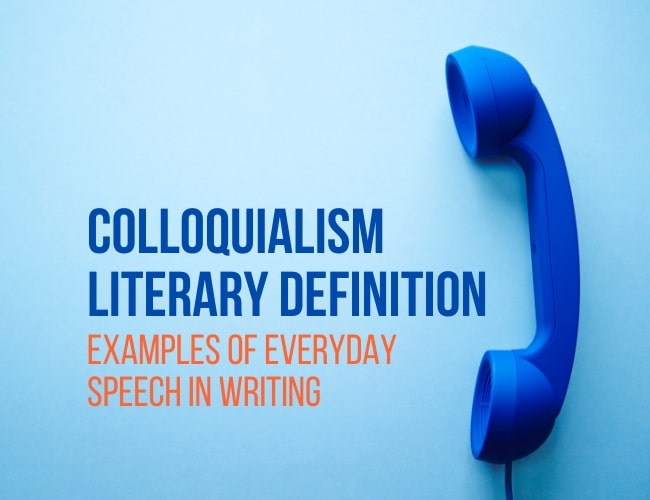Y'all ready for a banger of a grammar lesson today? Let's look at a colloquialism literary definition, some examples, and how to use everyday speech in your writing.

“Sometimes you just gotta do what you just gotta do: get rid of the government you’re under and form a new one. It’s our natural and God-given right to do so. When we exercise that right, however, we should at least have the common courtesy to tell everyone else why.”
Does the above paragraph seem vaguely familiar? You recognize the sentiment somewhere but can't quite place it? Relax. You aren't experiencing memory loss. Joel McDurmon rewrote the Declaration of Independence in “plain English” for a modern audience. (See the article here.)
Compare it to the original.
“When in the Course of human events, it becomes necessary for one people to dissolve the political bands which have connected them with another, and to assume among the powers of the earth, the separate and equal station to which the Laws of Nature and of Nature's God entitle them, a decent respect to the opinions of mankind requires that they should declare the causes which impel them to the separation.”
The original is cast in formal language, while the rewrite is in what we would call colloquial language.
So, just what is a colloquialism or colloquial language? Let's find out.
Colloquialism Literary Definition
According to Merriam-Webster, a colloquialism is “a colloquial expression.” Wasn't that helpful?
When we look up “colloquial,” we learn that it means, “used in or characteristic of familiar and informal conversation.”
So, a colloquialism is an expression used in or characteristic of casual speech. It can also be a local or regional dialect expression. This is critically important to understand as you write dialogue for characters.
In our example, the original is written in a formal style that matches the gravity of the situation. The rewrite is the way you might explain the content to a friend who is unfamiliar with the document at the coffee shop. It's more everyday language.
Historical Context of Colloquialism
Since colloquial language is simply the way people talk in everyday, casual conversations, it has existed as long as there has been language.
Latin had a formal version and informal, colloquial versions. The influence of Latin's more widely spread colloquial language appears in modern languages.
For example, the higher-register word for “horse” in Latin is equus, and we see it in the word equestrian. The colloquial word, however, was caballus, which leads us to Spanish caballo and French cheval, from which we eventually derive the English word ‘chivalry,' i.e., the code of conduct for mounted warriors. (The French word for a knight, a mounted warrior, is chevalier, part of the word family derived from Colloquial (or Vulgar) Latin caballus.)
Colloquial speech plays a significant role in the fascinating history of English. At base, English is a Germanic language, Anglo-Saxon. With the Norman Conquest, it received a French overlay. Since the Normans were the elite, their language became the cultivated, formal speech. The language of the Anglo-Saxon natives remained as colloquial language.
As a result, English possesses many dualities that are absent from other languages. Some examples include freedom vs liberty, sheep vs mutton, kingly vs royal, and wordbook vs dictionary. These are just differences in formal writing versus more informal speech.
Different regions also have different terms for the same item. The same sandwich might be a sub, a hoagie, a hero, or something else, depending on where you are. To go along with it, you might ask for a soda, a pop, a soda pop, a soft drink, or a coke (as a generic term in the South).
Types of Colloquialism and Examples of Colloquialism
Slang as a form of colloquial expression
Slang is a specialized form of colloquial expression in that it belongs to a smaller group and often serves the purpose of hiding meaning from the larger population. When slang terms enter the broader lexicon, the group finds new words. This can involve single words and phrases.
Perhaps you have a BFF, a slang term for a best friend. Or you want to spill the tea, that is, divulge the latest item of gossip.
Idiomatic expressions in everyday conversations
An idiom, unlike slang, belongs to the wider community and is characterized by having a meaning that is not apparent from the words.
At the end of the day, for example, you might decide to hit the hay. A literalist will imagine you striking a bale or pile of hay instead of going to bed. If something is up in the air, it is undecided, but if you are walking on air, you are extremely happy.
Regional colloquialisms across different cultures and languages
As mentioned above, the United States has a plethora of regional colloquial expressions. Differences in expression occur between US and British English as well.
Someone from the UK might wear trainers while in the US we wear sneakers, gym shoes, tennis shoes, or tennies. Wearing these shoes, our sportsman might play either football or soccer, depending on location.
Colloquialism in Literature: Authors and Works
Of course, we are interested in colloquialisms in literature because we are writers. Fortunately, we have excellent examples.
The Bible has supplied the English language with many colloquial expressions, such as “in the twinkling of an eye,” “writing on the wall,” “a lamb to the slaughter,” “wolves in sheep's clothing,” and a multitude more
Shakespeare used colloquialisms and provided us with many words and phrases that have become colloquial. “All's well that ends well,” “a sorry sight,” and “a pound of flesh” are three.
Charles Dickens in “A Christmas Carol,” assures readers that “Old Marley was as dead as a door-nail.”
Mark Twain left a lasting impression on American literature through his use of colloquial speech in The Adventures of Huckleberry Finn.” He uses colloquialisms to give his characters their unique voices, reveal the setting (pre-Civil War Missouri), and show us the characters.
Huck introduces himself: “The Widow Douglas, she took me for her son, and allowed she would sivilize me; but it was rough living in the house all the time, considering how dismal regular and decent the widow was in all her ways; and so when I couldn’t stand it no longer, I lit out.” [Emphasis mine]
A more modern author, J.D. Salinger, in Catcher in the Rye reveals Holden Caulfield's age, background, and attitude through colloquial speech: “If you really want to hear about it, the first thing you’ll probably want to know is where I was born, and what my lousy childhood was like, and how my parents were occupied and all before they had me, and all that David Copperfield kind of crap, but I don’t feel like going into it, if you want to know the truth.” [Emphasis mine]
Significance and Effectiveness of Colloquialism in Literature
So, what do we gain from using colloquialisms in our writing?
Realness, man. It gives readers a sense of verisimilitude, i.e., a realistic depiction of our characters and setting. We give readers a sense of place and reveal our characters through their speech. We can indicate education level, region, and more.
This applies to science fiction and fantasy settings as well. Make up colloquial speech patterns for your world. Discover historical colloquialisms for your historical fiction.
Colloquial expressions also make reading more like having a conversation rather than reading a formal treatise. Readers can find a cozy nook and spend time with their (imaginary) friends in a new world. We draw readers in.
Should Writers Use Colloquialisms in their Work?
Absolutely—unless you're writing formally. But we need to keep the practice within bounds and find the Goldilocks setting, neither too much nor too little.
How do you feel about colloquialism in your writing? When do you find it most effective? When does it flop? Let us know in the comments.
PRACTICE
Now it's your turn. Here are a couple exercises for you. Set the timer for fifteen minutes.
1. Find colloquial expressions in a favorite book or a classic. Analyze the passages. How does the writer use them to reveal their characters, the setting, social and class structure, etc?
2. Similar to the introduction, write a short passage in formal language and then rewrite it in colloquial language to see how they differ, including the impression they give.
Share your practice in the Pro Practice Workshop, and leave feedback for a few other writers. Not a member? Join us.

Robert Harrell
Robert Harrell is a grammar nerd—and a language teacher, medieval re-creationist, musician, traveler, and theologian. His interests inform his stories and coaching. Published in German, Spanish, and French, with two English-language YA/NA series underway, Robert is pursuing The Write Practice Book Coach Certification to help other writers excel. Learn more at his website.




Lost as a hank
Meaning?